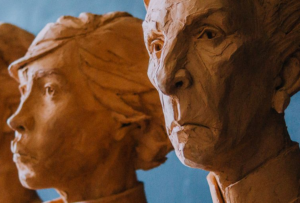This article originally appeared in the student publication, The USV Chronicle. It is written by Andrew DiLullo, who graduated in 2017 after receiving USV Excellence Awards in both 2016 and 2017. It has been lightly edited.
1. GRADES ARE A SECOND PRIORITY
This is more a mindset than a rule and something I honestly believe. Grades are secondary. In the grand scheme of things, grades will likely not get you the job you want. You still need reasonable grades to get your diploma, but grades themselves should not be the foundation of your education. What’s most important, I think, is really internalizing everything you learn. It doesn’t make sense writing down the notes on the board if you don’t understand what they mean. By the same token, memorizing the test answers doesn’t matter if you can’t make the knowledge count. Don’t get fixated on getting the best score: I’ve found that if you focus on the lesson, the grades will come.
This won’t always seem applicable, especially while slogging through Gen Ed classes far removed from your degree. And yet, for those classes, I got so much further by taking or finding a point of interest rather than worrying about grades and on-paper performance.
For my USV education, grades were never on my mind. I only sought to perform honestly, give every assignment full attention, learn as much as I could and experiment at every opportunity. I walked with a “B” average and feel zero shame in that.

2. QUESTION YOUR FUN CONSTANTLY
There’s nothing wrong with playing video games, watching movies, listening to music, or even hanging with friends. Free time is healthy and can make your work more productive. That said, as an entertainer-in-training, you don’t have the luxury of just “playing” anymore. It’s critical that you find ways to incorporate your studies outside of the classroom at every possible chance. Don’t just watch film: study film. Study games, study music, study life. There’s nothing wrong with overthinking or overanalyzing when you’re a student; that’s your job.
The other obvious end of this is “manage your fun wisely.” I think free time is healthy, but it should always be secondary to your work. Not sure if you’re working enough? Ask a simple question: “Do I produce more or less than I consume?”
3. TALENT DOESN’T EXIST, SO EMBRACE YOUR LACK OF SKILL
It’s important to recognize that you are a student: it’s not expected that you can perform “at a professional level,” at least not yet. It’s okay to be bad at things. In fact, being bad at things is awesome.
A piece of industry advice you’ll often hear is “fail faster.” It’s about having an attitude of fearlessness. By not getting hung up on the outcome, you focus more on the process. Failing early and failing well means you can learn very quickly how something works, and also how it doesn’t. But I’ve found that “fail faster” is not that hard a lesson to teach because most USV students (from my observation) are not afraid to perform. The goal here isn’t just to instill fearlessness, but also to combat arrogance.
4. RULES ARE MADE TO BE…
…followed, actually. I’ve run into a number of fellow students who hold that stereotypical artist mentality: “You can’t put limitations on art, man. It has be true to itself. Why do you think the word ‘art’ is in ‘heart’?” (Real quote, not even joking.)
You will have to turn in a TON of projects between freshman and senior year, and every single one will have limitations and rules: we call them “standards.” As a creative, there’s a chance you will seek to break those rules because they clash with “your vision,” but I’ll stress that you need to follow those rules and work within your boundaries. Why? Because it will actually broaden your artistic skill.
Creativity is not a measure of how strong your ideas are in an empty void. True creativity is a measure of how strong your ideas are within a fixed space. Think of the brick wall not so much as a barrier as a massive canvas. The limitations you are given provide latching points for ideas to take root and grow uniquely. In the commercial art world, standards matter; no one has time to entertain your every flight of fancy. Embrace limitations now and over time you’ll wonder what you ever did without them. As Dennis Sopczynski often says: “Turn your liabilities into assets.”
5. FAILURE IS A SOLO VENURE
There were only two classes at USV in which I thought I might fail from a lack of skill. The first was Dennis’s Color Theory class. My first couple assignments were a string of Cs and Ds, and although it was difficult I ultimately decided to change my way of doing things, increasing my work hours every week. As a result, I finished the class incredibly strong, and while I still only averaged a C in the class, I learned an astounding amount in the process. But that’s not the important one.

The second class was Dustin’s “Intro to Sculpture” class. My primitive shapes were great, and when I turned in my first humanoid sculpture I thought I was doing well. Turns out, it was a complete failure, a mere 30%. It was such a shock: a class I’d thought I had a solid grasp on was completely slipping through my fingers without me knowing. I put in a lot more effort on the second project and tried to get some help with understanding anatomy. Better, but still a failure at 55%. With only two projects left, things weren’t looking great. So, I did the only thing I could: I asked for help. Specifically, I asked a friend of mine, Mari Smith, since she was a tutor for the class. I’ll skip ahead and tell you that in the end I managed to pass on the edge with a C-, but that was after an ungodly number of hours on both our parts. With confidence, I can say that I would’ve absolutely bombed that class without Mari’s help. Asking her to teach me outside of class hours was completely necessary for me to pass that class, and even though she’s my friend, I still had a very hard time asking her for help the first time.
I know most students don’t really like the idea of tutoring. It’s like a declaration of defeat, a public admission that you are somehow inferior. I figured sharing a life experience would help advocate its necessity because, as much as you don’t want it, it’s often probably the best choice in a series of alternatives. Failure is a solo venture. If you’re failing in a class, it’s on you to own it and respond in kind. Ask for help, get tutoring, watch online tutorials, do more research. Nine times out of ten you can recover from that failure, and the one time out of ten is often because you didn’t own it soon enough.
6. IT TAKES 10,000 HOURS
One of the best pieces of advice I ever got about college was something I read after I graduated.
10,000 hours: that’s how long it takes to become truly excellent at something, and for a creative pursuit it might take even longer. Chances are, it takes you about four years to graduate from USV, which is plenty of time to make 10k a reality. Let’s do the math: 2500 hours a year, spread over the course of 52 weeks equals about 48 hours a week. Sounds insane, right?
Well, maybe not. 48 hours a week means about 7 hours a day, or basically a full-time job. That’s what being a student is: it’s a full-time job. I would say that for my senior year, 7 hours a day led to mostly outstanding projects. 4 hours a day was the barest minimum, and admittedly I got away with 5.5-6 more often than I should have.
But the numbers aren’t really the important part. I was at the school every single day from at least noon until 1 AM, and a majority of that time was spent working either on class assignments or extracurricular projects. The goal here is to stay engaged with the projects you’re working on. I mentioned earlier that one of my goals was to “work honestly.” It simply means – whatever endeavor you take on, give it everything you can. I find that when you want to succeed in your studies, you’ll find the time to put in.
7. EXPOSE YOURSELF AS MUCH A POSSIBLE
The student body is made up of your future colleagues, so get involved with them. Consider joining ASB, sign up for the clubs that encompass your interests, and especially get involved with the academic clubs in your field: “Cogsworks Animation Club,” “Audio Engineering Society,” and “Game Development Club” are all great places to start. Go to Open Mic nights, participate in the Student Art Show and Excellence Awards, go see free movies with the Student Body. Take it from someone who got the Student Life Award at graduation: the more you involve yourself with your fellow students, the more rewarding USV can be. This isn’t just a school after all: it’s a family. The connections and impressions you make now will carry you a long way going forward.


